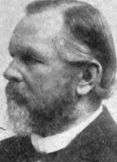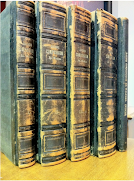I have previously published in 2012 a pre-publication book review by Franz Pieper on the book series Baier-Walther Compendium I have recently discovered that another review was published for Volumes I and II in Lehre und Wehre at a later time by Prof. E. A. W. Krauss after some of volumes were completed in 1879. He was not yet a professor in St. Louis at this time, but was the Director of the Teacher's Seminary in Addison, Illinois. As I translated this review, I was struck by the insight that Krauss had for the importance of this series in the instruction of Lutheran Dogmatics.
- - - - - - - - - - - - - - - - - -
From Lehre und Wehre, vol 25, no. 8 (August 1879), p 242-243); translation by BackToLuther using mostly DeepL and Yandex. Highlighting and bolding are my emphasis.
Joh. Guilielmi Baieri Compendium Theologiae Positivae, adjectis notis amplioribus, … denuo edendum curavit Carol. Ferd. Guil. Walther, ss. th. Doctor et Professor. Editio auctior et emendatior. In urbe Sancti Ludovici ex officina Synodi Missouriensis Lutheranae. MDCCCLXXIX. Vol. I. II.
The new edition of the Compendium of Baier, which is now being delivered, has, by the grace of God, progressed so far that volumes I and II of it now lie before us in a stately, elegant half-French binding. It is a pleasant task for us to be able to communicate this to the honored readers of Lehre und Wehre. For there is no doubt that many who for various reasons have refrained from purchasing the individual deliveries until then will now gladly take the opportunity to take possession of the precious expanse which is now half completed.
It is true that the reader has already been informed of the internal arrangement of the latter, as well as of how it differs from the earlier editions of the Baier Compendium; but we shall be permitted to emphasize once more the characteristics of the new edition.
First of all, it offers the readers a text that is as clean as possible from printing errors. The errata inherent in the older editions and especially the most recent, often disruptive errata provided by Preuss, have been carefully corrected, so that in this respect the new edition may brazenly be described as the best of all that has been published so far.
But what gives the former great value above all are the new additions made by the esteemed editor, Dr. Walther. Well, it is his well-known and well-tried way of not expressing his dogmatic conviction with his own words but with the words of our Lutheran fathers. And that the dear man did not find the leisure to write a dogmatic according to his own design in his own words is something we, together with our honored theological readers, and indeed with the entire Lutheran Church of this country, regret with all our hearts.
But the additions from the fathers which Dr. Walther added to Baier's arguments were chosen with such astonishing dogmatic meticulousness, with such detailed expertise, with such a surprising consideration of what must be brought back into the consciousness of the Church, especially in our time, that the reader has in them, together with Baier's text, not only a complete compendium of the dogmatic work of our Church, but at the same time also an armor [πανοπλία, Eph. 6:11] of the orthodox doctrine with which he can confidently enter the struggle with the proud spirits of modern theology without having to fear defeat.
There is no question in which our so-called Missouri theology is consciously opposed to modern “theological science”, which is not touched on in the new edition of Baier and which would be answered satisfactorily from God's Word either with the simple, edifying words of a Gerhard, or in the ingenious manner of a Dannhauer, or with the transparent logic of a Quenstedt. Even on open questions, proper secondary questions [quaestiones adnatae], insofar as they are of any importance, Walther brings rays of light from God's Word; he conscientiously juxtaposes pros and cons with the words of orthodox teachers, but never leaves the reader in the dark as to which opinion he himself is inclined to hold and which he therefore considers to be the more Scriptural.
Particularly valuable are the antitheses added by Dr. Walther, in which the contrast to the developed doctrines is expressed. Older, later, and the latest false teachers — the latter, if they claim the name “Lutheran” for themselves — fill this catalog of heresies [Catalogus haeresium], and especially with regard to modern theologians it is of great value that they thus are revealed and judged as Pseudo-Lutherans by their own words. At the same time, the antitheses also offer interesting dogmatic-historical material.
Thus this precious work, which of course is predestined for the use of our students, is warmly recommended to all lovers of thorough dogmatic studies. For most of our dear readers, the difficulties of studying it have long since disappeared, and for others they are all the easier to overcome, since the difficult technical terms [termini technici], where they occur for the first time, have been explained by a quotation from Scharff, Walch, or others. A foundation and fortification in the saving doctrine will be the rewarding success of all the effort put into Baier's Enlarged and Corrected Edition [Editio auctior et emendatior].
Volumes I and II contain the Introduction [Prolegomena] and the first two parts; the third volume will contain the third part of the Compendium together with Indexes. The price of the present volume, for its excellent features in every respect, is justly $3.50. E. W. K. [E. A. W. Krauss]
– – – – – – – End of Review – – – – – – – –
Unfortunately I could not find a review of Volumes IIIa and IIIb in Lehre und Wehre. But the above comments would certainly apply for the whole series.
It is a sad failing of the LCMS Christian Cyclopedia, in its description of Prof. Krauss, that it did not carry forward the full history of him from Old Missouri's The Concordia Cyclopedia of 1927. Krauss shows not only his scholarly understanding of theology, he also understood the great spiritual value of Walther’s undertaking for this book series. The 1927 Cyclopedia even pointed out Krauss's "stupendous learning" and that his work was "highly edifying to the lover of Lutheranism" – high praise indeed, especially for Old Missouri! We found a brief mention of him in Hochstetter's History (p. 176), and then we saw him grow greatly in his spiritual understanding in the Predination Controversy on p. 377, just 1-2 years after this book review was written. That experience mimics Hochstetter's own experience of coming out of darkness by the Word of God and the Lutheran Confessions.







No comments:
Post a Comment
Comments only accepted when directly related to the post.